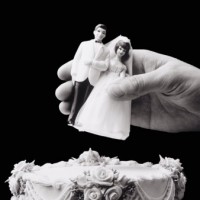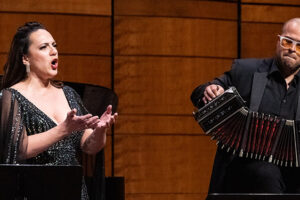

The program at MSM changed greatly since Dona D. Vaughn took over the helm of their Opera Studies program last year. Instead of presenting obscure or new works that do little to train singers for their coming careers, they now present standard repertory that teaches young singers important aspects of the trade, such as how to sing Italianate secco recitative, clear Italian diction, and movement in period clothing.
When you go to a production of Figaro and skim through the bios of the performers, you don’t really expect to see the following for your Susanna:
Megan Pachecano (Susanna) most recently performed the role of Meg Page in scenes from Verdi’s Falstaff. Other roles include Cherubino in Le Nozze di Figaro, Orlofsky in Strauss’ Die Fledermaus, Zweite Dame in Mozart’s Die Zauberflöte, Miss Pinkerton in Menoti’s The Old Maid and the Thief...
And yet you keep going, and reach the bio for Cherubino.
Soprano Rachel Arky recently sung Donna Elvira in Don Giovanni, Belinda in Dido and Aeneas, Fiordiligi in Cosi fan tutte and the title role in Susannah.
While this is a little less jarring, still it makes you curious for what’s to come.
This Nozze was, without hyperbolical embellishment, worthy of a stage far greater than Borden Auditorium. Ms. Pachecano’s sketchy bio hardly prepared me for her clear and beautiful tone, easily caressing challenging passages with elegance and Mozartian grace. Her coy, witty and sexy characterization was aided by her alluring eyes and effortlessly beautiful stage presence. With Ms. Pachecano, as well as her sure voiced and very funny Figaro, Robert Mellon, you could clearly see MSMs impetus of training real singing actors, and not just competition winners.
As the Count, Joo Won Kang had the kind of burnished timbre and sizable voice that could almost be considered too heavy for this role; really he is more suited for Verismo roles such as Alfio. Luckily, Mr. Kang doesn’t power his way through the role, but instead finds all the right colors for the Count, unleashing the anger and volume that is so appealing in his voice only when absolutely necessary. His ‘Hai gia vinta’ was clearly the audience favorite of the night, receiving a hearty and lengthy round of applause.
I feel Ms. Arky is at a crossroads in her career, one that many young female singers struggle with; wrestling with fach. I again could have been fooled by her bio, as Ms. Arky’s ‘Non so piu’ instantly reminded me of another MSM Alumna, Susan Graham. She was the comedic hero of the evening, quirky and boyish, but also loving and sexual both in character and in voice when need be. Whether she decides to call herself a soprano or mezzo-soprano is up to her, but she has a great ability in her voice to sing these types of Mozart and Rossini roles in the way that Ms. Graham, as well as Joyce DiDonato, do so well.
Ashley Dannewitz performed the Countess with nobility and fortitude of will, but she is still clearly figuring out how to best use her sizable lyric soprano. There were lovely moments, but the phrasing that one needs for the role wasn’t there, and consistency between registers is still a bit of an issue. Colin Ramsey was a stentorian and able Bartolo, a young basso with a dark yet well projected sound that made the good doctor all the more pompous.
It is really a shame that the largest tenor role in Nozze is that of Basilio, because what little you get to hear from Christopher Lucier is wonderful. He has a large and beautiful lyric voice, perfectly suited for bel canto roles; but even with his short role he showed his potential.
The major letdown of the evening was the rigid and unpredictable conducting from Giovanni Reggioli. The overture was painted in shades of grey, and there were many moments where Reggioli lost his singers or orchestra. In this reading, Reggioli tried to turn Mozart into Puccini with large swings in tempo and the addition of rubato where there is none. The train wrecks that resulted I place squarely on his shoulders. I’m sure that he could have benefited from more rehearsal time, which is always at a premium for school productions, but he absolutely should have been more able in this work.
This cast performs again Sunday, May 2nd, and an alternate cast performs Friday, April 30th.























Comments